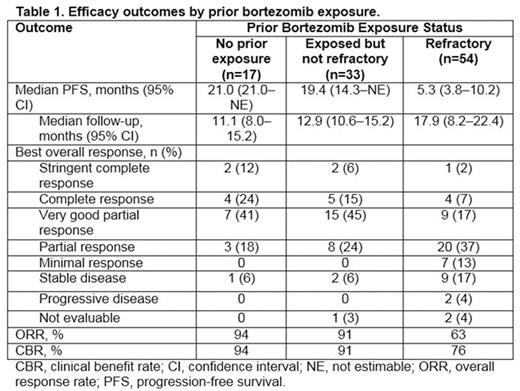Abstract
Background: The multicenter phase 1/2 CHAMPION-1 study (NCT01677858) showed that once-weekly carfilzomib and dexamethasone was well tolerated and active in patients with relapsed or refractory multiple myeloma (MM) (Berenson et al. Blood. 2016;127:3360−3368). We present a secondary analysis of the efficacy and safety of once-weekly carfilzomib with dexamethasone in the CHAMPION-1 study according to prior bortezomib (BTZ) exposure and age.
Methods: Patients with relapsed or refractory MM (1−3 prior therapies) were eligible. The primary objectives were to determine the maximum tolerated dose (MTD) of once-weekly carfilzomib with dexamethasone (phase 1) and to determine the overall response rate (ORR; phase 2). Secondary objectives included assessment of safety and tolerability, and evaluation of the clinical benefit rate and progression-free survival (PFS) in the phase 2 portion.
Patients received carfilzomib as a 30-minute, intravenous (IV) infusion on days 1, 8, and 15 of 28 day cycles. Patients received carfilzomib at 20 mg/m2 on cycle 1, day 1; subsequent doses were escalated to 45, 56, 70, or 88 mg/m2, using a standard 3+3 escalation schema to determine the MTD. In the phase 2 portion, patients received carfilzomib at the MTD. All patients received dexamethasone 40 mg (IV or orally) on days 1, 8, 15, and 22 of 28 day cycles for cycles 1−8; dexamethasone was omitted on day 22 for cycles ≥9.
The MTD of once-weekly carfilzomib (30-min IV infusion) with dexamethasone was established to be 70 mg/m2 (Berenson et al. Blood. 2016;127:3360−3368). In this secondary analysis, the efficacy and safety of once-weekly carfilzomib at this dose were evaluated by prior BTZ exposure (no prior exposure vs exposed but not refractory vs refractory) and age (<65 vs 65−74 vs ≥75 years).
Results: The data cutoff date for this analysis was Nov 5, 2015.A total of 104 patients (phase 1 and 2; <65 years, n=34; 65-74 years, n=41; ≥75 years, n=29) received carfilzomib at a dose of 70 mg/m2 (no prior BTZ exposure, n=17; prior BTZ exposure but not BTZ-refractory, n=33; BTZ-refractory, n=54). The ORR for all 104 patients receiving the 70 mg/m2 dose was 77%; the median PFS was 14.3 months. Efficacy by prior BTZ exposure is presented in Table 1. The ORRs were 94%, 91%, and 63% for patients with no prior BTZ exposure, those exposed but not refractory to BTZ, and BTZ-refractory patients, respectively. The proportions of patients who achieved a complete response (CR) or better were 35% (no prior BTZ exposure), 21% (exposed to but not refractory to BTZ), and 9% (BTZ-refractory). The median PFS durations were 21.0, 19.4, and 5.3 months in these subgroups, respectively.
The median treatment durations by age were 6.4 months (<65 years), 6.2 months (65-74 years), and 9.9 months (≥75 years); mean cumulative doses of carfilzomib received were 1876.8, 1846.5, and 2156.1 mg/m2, respectively. Efficacy and safety outcomes by age are shown in Table 2. The median PFS durations were 7.4 and 10.2 months for patients aged <65 and 65−74 years, respectively; the median PFS was not reached for those aged ≥75 years. The ORRs were 79%, 73%, and 79% for patients aged <65 years, 65−74 years, and ≥75 years, respectively. The ≥CR rates were 26% (<65 years), 15% (65-74 years), and 10% (≥75 years). Overall rates of treatment discontinuation were similar among age subgroups (Table 2). The rates of treatment discontinuation due to adverse events were 3% (<65 years), 17% (65−74 years), and 21% (≥75 years). The proportions of patients with at least one grade ≥3 adverse event were 56% (<65 years), 61% (65−74 years), and 76% (≥75 years). Rates of grade ≥3 adverse events of interest by age are shown in Table 2.
Conclusions: Once-weekly carfilzomib (70 mg/m2) with dexamethasone was safe and active for patients with relapsed or refractory MM, regardless of prior BTZ exposure or age. As expected, the median PFS durations in the BTZ-naïve or -sensitive patients were longer relative to that in the BTZ-refractory patients. Although there were higher incidences of grade ≥3 adverse events and treatment discontinuations due to adverse events in older patients (≥65 years) relative to younger patients (<65 years), median PFS was not negatively affected by increasing age. Overall, once-weekly carfilzomib with dexamethasone had a favorable benefit-risk profile in patients with relapsed or refractory MM, irrespective of prior BTZ exposure or age.
Berdeja:Abbvie, Acetylon, Amgen, Bluebird, BMS, Calithera, Celgene, Constellation, Curis, Epizyme, Janssen, Karyopharm, Kesios, Novartis, Onyx, Takeda, Tragara: Research Funding. Rifkin:Amgen/ONYX: Membership on an entity's Board of Directors or advisory committees; Takeda: Membership on an entity's Board of Directors or advisory committees; Celgene: Membership on an entity's Board of Directors or advisory committees. Yang:Amgen Inc.: Employment, Equity Ownership. Aggarwal:Amgen: Employment, Equity Ownership. Iskander:Amgen Inc: Employment, Equity Ownership. Berenson:Amgen Inc: Consultancy, Honoraria, Research Funding, Speakers Bureau.
Author notes
Asterisk with author names denotes non-ASH members.



This feature is available to Subscribers Only
Sign In or Create an Account Close Modal